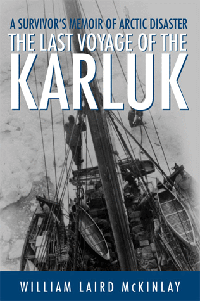

Karluk
William Laird McKinlay
Weidenfeld and Nicolson, 1976, reprinted 2000
ISBN 0 297 64368 1
Karluk tells the story of the 1913 Canadian expedition in the eponymous ship that set out to explore the arctic north of Alaska. That goal was accomplished by the expedition leader, Vilhjalmur Stefansson, who spent five years in the far north, discovering three major islands. To Stefansson’s shame, that story is not the story of the Karluk, nor of this book. After just a few weeks, the ship broke away from the mainland ice and Stefansson, away hunting, never found it again - and seemed to spend little effort trying. The Karluk drifted helplessly towards Siberia, and its fate is related by one of those on board, the expedition meteorologist William McKinlay, then a 25-year-old Glasgow schoolteacher. The ship was crushed by ice in January 1914 - as her captain Robert Bartlett played Chopin’s Funeral March on the gramophone - and the crew made their way to Wrangel Island. From there Bartlett, one-time lieutenant of Robert Peary and the hero of McKinlay’s narrative, went for help, travelling 700 miles on foot. He returned with relief ships in September, but 11 men had not survived, and McKinlay’s is the only narrative of what happened in the intervening months on Wrangel.
It is a story of humans at their most basic, with the quest for food overriding all else. McKinlay describes in painful detail the joy of catching birds yielding the tiniest scraps of meat, and the anguish of discovering companions stealing food from one another. One man shot himself and two others appeared to die of sheer lassitude, adding to the loss of eight men before they had even reached the island. Stefansson had made no attempt to select personnel for experience or personal qualities, and for McKinlay the lack of comradeship made the experience harder to bear even than the horror of Passchendale, which he encountered three years later. He was in his late 80s before he could confront his arctic demons sufficiently to record his experiences, but as a result we have a uniquely authoritative account of what would otherwise be a tragic footnote to another, flashier man’s career.
Jonathan Dore